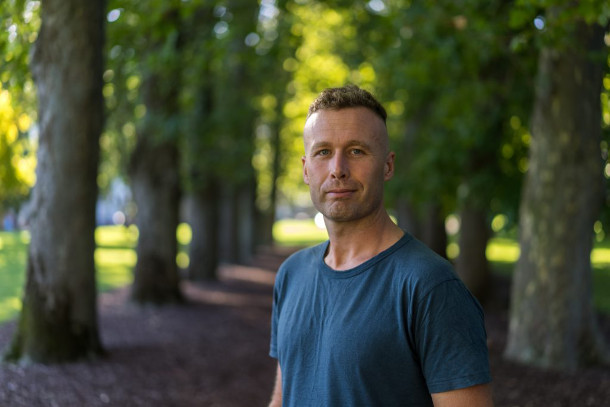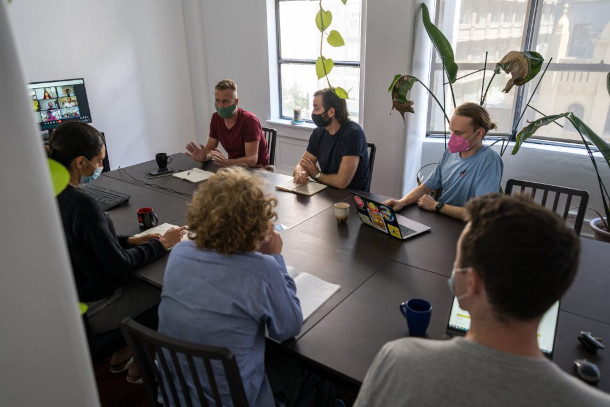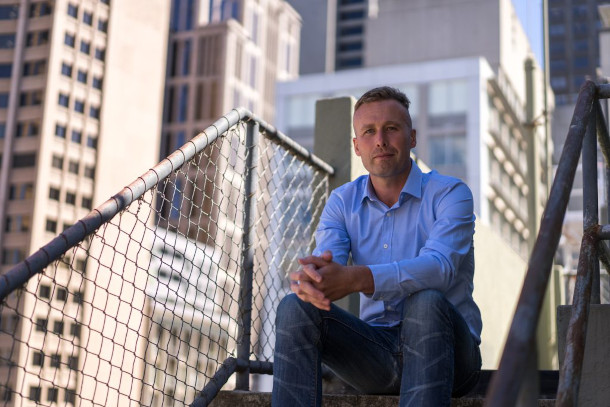Cutting Up Credit Cards to Stop Coal
Air Date: Week of June 3, 2022

Julien Vincent is the executive director of the Australian organization Market Forces. (Photo: Goldman Environmental Prize)
The winner of the 2022 Goldman Environmental Prize for Islands and Island Nations is activist Julien Vincent, who led a grassroots campaign that convinced some of Australia's biggest banks and insurers to commit to ending backing for coal projects by 2030. He joins Host Jenni Doering to talk about the impact of targeting the fossil fuel industry’s financial support.
Transcript
CURWOOD: It’s Living on Earth, I’m Steve Curwood
DOERING: And I’m Jenni Doering
If you don’t like that your bank lends money to support and expand fossil fuel production, cut up your credit card! That’s the advice of Australian Julien Vincent, winner of the recently announced 2022 Goldman Prize for Islands and Island Nations, It’s awarded annually to outstanding environmental heroes on each of the inhabited continents. Julien is the executive director and lead campaigner of the NGO Market Forces. He organized campaigns and protests that eventually caused four of the largest banks in Australia to commit to ending funding for coal projects by 2030. Also Australia’s major insurance companies will stop underwriting fossil fuel enterprises. Julien Vincent joins me now from Melbourne, Australia. Welcome to Living on Earth!
VINCENT: Thank you so much for having me on the show. It's great.
DOERING: So what sparked your interest, way back, in the environment and environmental protection?
VINCENT: Well, when I went to university, it was with the intention of being a weatherman, basically, I loved weather and climate and wanted to be a meteorologist. And so I went in and started getting lectures, and this is about 20, or so years ago, from scientists who were quite obviously freaked out about the state of the climate. And the issue really didn't have anywhere near the amount of public attention level and acceptance or concern back then. And you can quite clearly convert graphs and charts and tables into phenomenally profound impacts onto the world, onto the state of the biosphere, onto communities. And you could just see that sort of pervasive impacts that would take place if we would allow this to continue and accelerate. And so that put a rocket up me basically. And from that moment on, I was off and running, and just wanted to be part of trying to solve this issue in whatever way possible. And if you can stick around long enough and have a bunch of different experiences, you sort of figure out what activism done well looks like increasingly. And then of course, the other key moments, the pivot in my story is starting to win some campaigns stopping new fossil fuel projects, by going after the money and realizing well, there is a need here for something, a group or some entity that focuses day in day out on the role of finance and investment. Because it is obviously pivotal, but nowhere near as much attention was being paid as it should have been.

Julien Vincent organized a grassroots campaign that targets Australia’s largest financial institutions and convinces them to stop investing in coal projects. (Photo: Goldman Environmental Prize)
DOERING: Yeah. Tell us more about that. What made you decide to address climate change by targeting the financial backing of the coal industry?
VINCENT: By succeeding on that basis. So I think one of my last campaigns when I was at Greenpeace, I worked there for about six and a half years as a climate and energy campaigner. And we were stopping projects by preventing them from securing finance from our major banks, without which other sources of secondary funding or even government funding would fall over. And the project itself would fall over and essentially disappear. And so that just opened my eyes to the incredible influence and power of financial institutions. I mean, it's quite easy now to look back with hindsight and think, why didn't we see this earlier, because there's so much work being done on banks and other kinds of investors these days. But back then, you know, we were very much focused on grassroots organizing, and local political campaigns and governmental campaigns at a national level, all of which are still very important, arguably more important today than ever before. But there was just this, this gap, that I thought, well, let's just throw myself into working in this space and see where it goes.
DOERING: And by the way, how big of a deal is the coal industry in Australia?
VINCENT: Not as big as the coal industry makes out. It obviously employs in the tens of thousands of jobs, there's actually been polling done that shows there's something like 10 or 20 times more value or more employment perceived by the Australian public from the coal industry as to what it actually provides. So what the coal industry does is a very good job of marketing itself. However, it's obviously better resourced than NGOs. And so it can do flashy marketing, and inflate its image, which is done to great success. Where I would give the coal industry credit, if that's what we want to call it, is it and Australia has a really outsized impact compared to our scale, our population on the global carbon supply chain, and we're certainly one of the biggest coke and coal miners in the world. We're attempting as a nation to rival Qatar to be the biggest exporters of LNG. We're basically pededlers. We're just peddling this dirty fuel around the world. And so that's what our coal industry is, has been able to do. And it will do what companies do, it will get away with as much as what the community allows it to get away with. And what we're trying to do here is point out that, as we've done with our divestment campaigns in Australia, that people don't want their finances associated with activities that contradict their values. And people in Australia and around the world care about acting on climate change. They don't want the custodians of their money, being able to use it to counter their very strongly held values of environmental protection, and avoiding catastrophic climate change. One of the things that we've done and I think it's the responsibility of grassroots groups and NGOs is to help facilitate people to exercise that power really effectively. You know, one of our great tactics in the early days was to organize people to come together en masse and close their accounts with their banks, as little Divestment Days we would call them. And what was great about that was that it didn't matter if you had a million dollars in your account or $10 in your account. The point was that you were being public, you're visible. And essentially, we were starting a conversation about how people in Australia, in this case, didn't want their finances connected with more environmental damage through fossil fuels. This is totally replicable anywhere else.
DOERING: And by the way, with these Divestment Days, there was a very symbolic act that I think you would ask people to do.
VINCENT: I believe you're talking about something involving a credit card and a pair of scissors.
DOERING: Yeah.
VINCENT: Yeah. I mean, that made for great imagery. And I would recommend that to anyone who's contemplating a Divestment Day anywhere else in the world. You know, it was one of those brilliant moments where people just enjoyed doing something that in so many other respects, we're talking about changing bank accounts, it's such a mundane thing to do. But we went and we made it fun. We made it fun, and something that actually exerted power and influence and has contributed to lasting change from these banks, which have since then, not just with the Divestment Days, but a lot of other work too, have now committed to being out of thermal coal by 2030.
DOERING: And by the way, how did you convince the finance executives that they needed to stop funding coal projects?
VINCENT: By building enough power. By having enough people doing what I was describing before, whether it's organizing to delete your account publicly and make some noise about it, or organizing shareholders, to cause a scene at the Annual General Meeting and ask questions of directors that made their life more uncomfortable or challenge them just on their climate credentials. In fact, one of the best avenues for changing companies of all sizes is staff. And no company wants a disenchanted staff base. And we've seen a number of companies shift policies and, and even shift their positions on individual projects as a result of staff organizing, and working really constructively internally, that doesn't even need to be adversarial, to make it clear what their expectations are. So again, it just comes back to building power. On the other side of what we're trying to get done are very wealthy, and powerful, and entrenched fossil fuel companies. And their friends in Parliament around the country. And we need to counter that. And so it's simply a matter of doing and engaging and looking for more ways in which you can tap into the community's power. People power is real, it's useful. Without it we wouldn't have had all of this change, it's simply a matter of people being willing to exert the influence that they have and use the power that they have. And organizations like my own being as effective as we can in making it possible for for that power to be exercised.

Australia’s largest banks and insurers have committed to stop funding coal projects by 2030. (Photo: Goldman Environmental Prize)
DOERING: So, you've been able to secure some really pretty strong commitments from Australia's largest banks and major insurers. Tell us about what they've said they'll do.
VINCENT: Well, all of our big four banks, they're the ones that do just about all of the lending to the fossil fuel sector. And they've all committed to have their exposure to coal trend down to zero by 2030. So that's just means that between now and 2030, the degree to which they'd be exposed to the coal sector will diminish and diminish and diminish and ultimately, tail out to zero by 2030, which is good, because that's one of the many things that we need to get done to meet the goals of the Paris Agreement. It's not everything, but it's one thing that we can tick off the list. And probably even more importantly, our insurance industry. So we've got three big insurers, including QVE, which is also present in the US. They've also committed to be out of thermal coal by 2030 or sooner and not insure new projects. In fact, one of our insurers, Suncorp, not to be confused with Suncor the oil company in North America, that insurer has committed to no longer insure new upstream oil and gas projects and also phase out its oil and gas exposure by 2040, which I believe was the first in the world to do that. So now, it's a question of how quickly can we expand this out to no expansion of any fossil fuels and start managing down and replacing this global coal oil and gas sector with clean renewables?
DOERING: Julien Vincent is the recipient for Islands and Island Nations of the 2022 Goldman Environmental Prize. Julien, thank you so much for joining us today.
VINCENT: Oh, thank you. It's a real pleasure.
DOERING: This was the second of six stories featuring this year’s Goldman Prize winners. Tune in to Living on Earth over the weeks ahead for the rest.
Links
Watch: Julien Vincent’s Acceptance Speech for the 2022 Goldman Environmental Prize
Goldman Environmental Prize: Meet the Winners
Listen to our conversation with 2022 Goldman Prize winner for Africa, Chima Williams
Living on Earth wants to hear from you!
Living on Earth
62 Calef Highway, Suite 212
Lee, NH 03861
Telephone: 617-287-4121
E-mail: comments@loe.org
Newsletter [Click here]
Donate to Living on Earth!
Living on Earth is an independent media program and relies entirely on contributions from listeners and institutions supporting public service. Please donate now to preserve an independent environmental voice.
NewsletterLiving on Earth offers a weekly delivery of the show's rundown to your mailbox. Sign up for our newsletter today!
 Sailors For The Sea: Be the change you want to sea.
Sailors For The Sea: Be the change you want to sea.
 The Grantham Foundation for the Protection of the Environment: Committed to protecting and improving the health of the global environment.
The Grantham Foundation for the Protection of the Environment: Committed to protecting and improving the health of the global environment.
 Contribute to Living on Earth and receive, as our gift to you, an archival print of one of Mark Seth Lender's extraordinary wildlife photographs. Follow the link to see Mark's current collection of photographs.
Contribute to Living on Earth and receive, as our gift to you, an archival print of one of Mark Seth Lender's extraordinary wildlife photographs. Follow the link to see Mark's current collection of photographs.
 Buy a signed copy of Mark Seth Lender's book Smeagull the Seagull & support Living on Earth
Buy a signed copy of Mark Seth Lender's book Smeagull the Seagull & support Living on Earth

